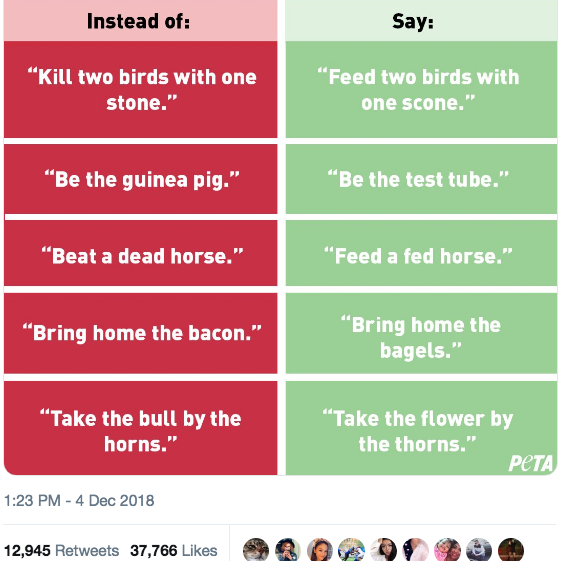Question 1, Why are the idioms listed speciesist?
The problem I see in PETA's attitude is that they've simply begged the question from the get-go. First they say "Here's how to remove speciesism from your daily conversation", then list a number of phrases that it implies are speciesist without any explanation as to why.
First of all, I think it's true that the actions described in these metaphors/expressions can indeed be seen as speciesist insofar as that in their most literal sense they describe things that humans do and have done to animals which may be seen as unjust. If you accept the proposition that animals are equal to humans in all rights (a proposition which itself may be dubious), you have denied the animal its rightful treatment. The analogy made seems to be one drawn from humans to animals. So for for example saying "off the reservation" can be racist because it harks back to a time when native Americans were legally confined to specific areas of land. Equally they claim it's speciesist because these phrases reflect the supposed maltreatment of animals. But there are so many disparities between the two that the comparison seems a silly one. Just to take one point, saying "off the reservation" may well offend people, but what animal are you offending by uttering these expressions? Also, it seems they have taken it for granted that killing animals is universally wrong. I stand with them in their quest to change human attitudes towards animals, however their logic is all over the place.
Having put that technical part side, they still in no way have shown how the utterance of these phrases is speciesist of itself. I take it most people love horses. Saying to beat a dead horse doesn't, in my opinion, show any disregard for the welfare of horses. Nor do I think it necessarily lowers our respect for horses as a species. Also, a bleeding-heart, vegan, animal-loving birdwatcher may use the expression "Kill two birds with one stone" without degrading one's respect for such creatures.
Question 2. How likely will we be seeing or hearing anti-animal idioms being replaced with the ones suggested by PETA in the future? Why/why not?
I have no idea. But I get the impression that this idea is not finding favour with the majority of people, and perhaps with even with the majority of animal-lovers. I read this story first on CNN, and here are a few tweets from people which may give you some perspective:
Hi, @peta. As someone who has had homophobic slurs shouted at him and
seen individuals physically threatened and beaten while anti-LGBTQ
epithets were hurled, your stupidity is not even laughable— it is
offensive to equate common animal idioms to racism, ableism, or
homophobia.
Do you ever wonder if PETA is a false flag set up by Big Meat to make
everyone hate vegans
I feel like PETA’s actual mission is to ensure that vegetarians and vegans are never taken seriously. I mean, they go onto compare this language to sexist/racist/homophobic slurs.
Link to CNN article
Question 3, In the history of English have there been any similar campaigns to replace or remove racist or ableist proverbs or idioms, and how successful were they?
I'm not sure how to answer this, because you refer to "similar campaigns", and I hesitate to say that most ideologically driven actions like this are very organised. I see them as general social phenomena.
Here are a few examples:
Since at least 1990 there has been pressure from groups to change the Canadian national anthem. One controversy has been to change "our home and native land" to "our home and cherished land" for reasons that, well, most people aren't REALLY "native" are they? Another one was about the lyrics "in all thy sons command", which many people wanted changed to gender-neutral language. Just this year, through legislation, the Canadian national anthem has had that part replaced with "in all of us command".
The title Ms in addition to Miss and Mrs goes back a while. It's tried to be revived and brought into common use a number of times. However this attempt only really succeeded and became widespread in around 1972 according to the Wikipedia article. Throughout its early days different commentators and style guides took differing opinions on its use. Needless to say this is a form language advocacy, to a greater or lesser extent organised by authoritative sources or just the general public.
In various municipalities/councils there has been a bit of controversy over referring to humans as "owners" of our pets. Suggested alternative are "guardian", "companion", "caretaker". Legally, however, they are property in most cases.
Various LGBT organisations who fight for equal treatment advocate for correct use of words. One example can be seen in this Guide to Terminology. Here you can see recommendations and cautions such as:
Terms to use:
gay (adj.)
lesbian (n. or adj.)
bisexual, bi (adj.)
Terms to avoid:
homosexual
Terms to use:
transgender(adj.).
Terms to avoid:
transgendered
a transgender (n.)
transvestite
tranny
Terms to use:
transition
Terms to avoid:
sex change
sex-change operation”
pre-operative / post-operative
Sometimes things like gender pronouns are specifically mentioned in legislation. One case of this that caused a bit of a stir was the Canadian C16 bill which became law. Although the bill itself doesn't create crimes or acts of discrimination out of refusing to use a person's preferred gender pronoun, I believe the concern of some is that that is exactly the effect it would have because the legislation does not stand alone, but rather is interpreted within the framework of the definitions of the Ontario Human Rights Commission. I don't want to get into this as it's controversial, and I'm not very knowledgeable about this legally. But this is another example.


